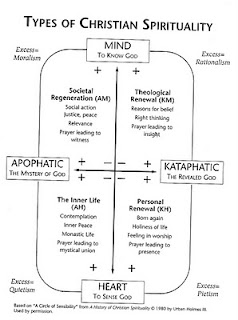Who needs theology? An imitation to the study of God ...
Thanks to new doctrine man at college Captain Steve Dutfield, I read a fascinating chapter in 'Who needs theology? An imitation to the study of God' by S. J. Grenz & R. E. Olson
I found some interesting parallels with some of the faith development material I have been reading as Grenz and Olson identify theologizing as a spectrum of reflection. This process of formalised thinking is how we use "our minds to organise our thoughts and beliefs, bring them into coherence with one another by attempting to identify and expunge blatant contradictions, and make sure that there are good reasons for interpreting Christian faith in the way we do". This, they suggest, is a necessary part of any maturing thought process as we reflect even to the extent that we may have been believing wrongly or incompletely.
Grenz and Olson locate their observation in the stages or levels of theological reflection that follow. I've paraphrased their thoughts, the extremities are where the church's influence will be undermined. With the bulk of congregations feeding from a theology that at best could be seen as a Folk Theology it would seem that there is quite some work to be done.
Here's what they say...
Folk theology - unreflective believing based on blind faith rejecting critical reflection and enthusiastically embraces simplistic acceptance of a tradition of beliefs and practices composed mainly of cliches and legends. Intellectual reflection is considered anti Christian even heretical. Folk theology is epitomised and perpetuated by popular Christian bumper stickers, choruses, cliches and legends. Lazy theology with little substance, comfortable with inner inconsistency and unquestionable belief in sensational stories and pithy cliches. It encourages gullibility, vicarious spirituality and simplistic answers to difficult dilemmas. It stunts growth and blunts the influence of Christianity in the world.
Lay theology - appears when folk theology with its simplistic cliches and legends is questioned. While seen by those characterised by a folk theology as evidence of a diminishing spirituality, lay theology represents serious attempts to examine and understand faith through seeking to bring Christian beliefs into a coherent whole through questioning.
Ministerial theology - more depth of reflection as attempts are made to interpret scripture and make more meaningful application to everyday life.
Professional theology - further still along the spectrum. Attempt to further develop critical consciousness. This sometimes appears to others as skepticism and hostility toward piety and devotion. This is a perception that is often laboured with great agony.
Academic theology - philosophical aimed at other theologians. Disconnected from the church with little application to Christian living.
Pp 25- 35
I found some interesting parallels with some of the faith development material I have been reading as Grenz and Olson identify theologizing as a spectrum of reflection. This process of formalised thinking is how we use "our minds to organise our thoughts and beliefs, bring them into coherence with one another by attempting to identify and expunge blatant contradictions, and make sure that there are good reasons for interpreting Christian faith in the way we do". This, they suggest, is a necessary part of any maturing thought process as we reflect even to the extent that we may have been believing wrongly or incompletely.
Grenz and Olson locate their observation in the stages or levels of theological reflection that follow. I've paraphrased their thoughts, the extremities are where the church's influence will be undermined. With the bulk of congregations feeding from a theology that at best could be seen as a Folk Theology it would seem that there is quite some work to be done.
Here's what they say...
Folk theology - unreflective believing based on blind faith rejecting critical reflection and enthusiastically embraces simplistic acceptance of a tradition of beliefs and practices composed mainly of cliches and legends. Intellectual reflection is considered anti Christian even heretical. Folk theology is epitomised and perpetuated by popular Christian bumper stickers, choruses, cliches and legends. Lazy theology with little substance, comfortable with inner inconsistency and unquestionable belief in sensational stories and pithy cliches. It encourages gullibility, vicarious spirituality and simplistic answers to difficult dilemmas. It stunts growth and blunts the influence of Christianity in the world.
Lay theology - appears when folk theology with its simplistic cliches and legends is questioned. While seen by those characterised by a folk theology as evidence of a diminishing spirituality, lay theology represents serious attempts to examine and understand faith through seeking to bring Christian beliefs into a coherent whole through questioning.
Ministerial theology - more depth of reflection as attempts are made to interpret scripture and make more meaningful application to everyday life.
Professional theology - further still along the spectrum. Attempt to further develop critical consciousness. This sometimes appears to others as skepticism and hostility toward piety and devotion. This is a perception that is often laboured with great agony.
Academic theology - philosophical aimed at other theologians. Disconnected from the church with little application to Christian living.
Pp 25- 35

Comments